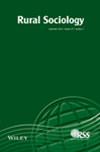What's Good for the Land is Good for the Farmer: Investigating Conservation‐Related Variables as Predictors of Farmers' Job Satisfaction☆
IF 1.9
3区 社会学
Q2 SOCIOLOGY
引用次数: 0
Abstract
Rising stress, mental health issues, and suicide rates among farmers highlight the need to understand factors influencing their job satisfaction. Farming presents distinct challenges with its unique mix of positive and negative characteristics. This study utilized dual‐factor theory to investigate how various factors, such as economic dynamics, farm financial health, stewardship views, experience with extreme weather, and climate change concerns, influence farmers' job satisfaction and dissatisfaction. Data from a 2020 survey of Iowa farmers were analyzed using ordinal logistic regression. Financial health, stewardship motivations, and perceived adequacy of conservation practices emerged as significant predictors of both job satisfaction and dissatisfaction. Farmers' extreme weather events experiences were positively associated with job satisfaction, indicating successful coping enhances contentment. Conversely, climate change concern was negatively associated with job satisfaction. As a revenue protection strategy, faith in crop insurance was negatively related to job dissatisfaction. In summary, besides the anticipated positive impact of farm financial health, the findings show that job satisfaction in farming is linked to stewardship motivations and perceived adequacy of conservation practices on the farm. The results suggest an opening for policies and programs aligning financial and conservation goals, potentially enhancing long‐term farmer well‐being and sustainable agricultural practices.对土地有益就是对农民有益:调查作为农民工作满意度预测因素的保护相关变量☆。
农民的压力、心理健康问题和自杀率不断上升,凸显了了解影响其工作满意度的因素的必要性。农业以其独特的积极和消极特征组合带来了独特的挑战。本研究利用双因素理论调查了经济动态、农场财务健康、管理观点、极端天气经历和气候变化担忧等各种因素如何影响农民的工作满意度和不满意度。我们使用序数逻辑回归法分析了 2020 年对爱荷华州农民的调查数据。财务健康状况、管理动机和对保护措施充分性的认知成为工作满意度和不满意度的重要预测因素。农民的极端天气事件经历与工作满意度呈正相关,表明成功应对极端天气事件会提高满意度。相反,对气候变化的担忧与工作满意度呈负相关。作为一种收入保护策略,对农作物保险的信心与工作不满意度呈负相关。总之,除了预期的农场财务健康的积极影响外,研究结果表明,农业工作满意度与管理动机和农场保护措施的充分性有关。研究结果表明,将财务目标和保护目标相统一的政策和计划可以提高农民的长期福利和可持续农业实践。
本文章由计算机程序翻译,如有差异,请以英文原文为准。
求助全文
约1分钟内获得全文
求助全文
来源期刊

RURAL SOCIOLOGY
SOCIOLOGY-
CiteScore
4.60
自引率
13.00%
发文量
47
期刊介绍:
A forum for cutting-edge research, Rural Sociology explores sociological and interdisciplinary approaches to emerging social issues and new approaches to recurring social issues affecting rural people and places. The journal is particularly interested in advancing sociological theory and welcomes the use of a wide range of social science methodologies. Manuscripts that use a sociological perspective to address the effects of local and global systems on rural people and places, rural community revitalization, rural demographic changes, rural poverty, natural resource allocations, the environment, food and agricultural systems, and related topics from all regions of the world are welcome. Rural Sociology also accepts papers that significantly advance the measurement of key sociological concepts or provide well-documented critical analysis of one or more theories as these measures and analyses are related to rural sociology.
 求助内容:
求助内容: 应助结果提醒方式:
应助结果提醒方式:


